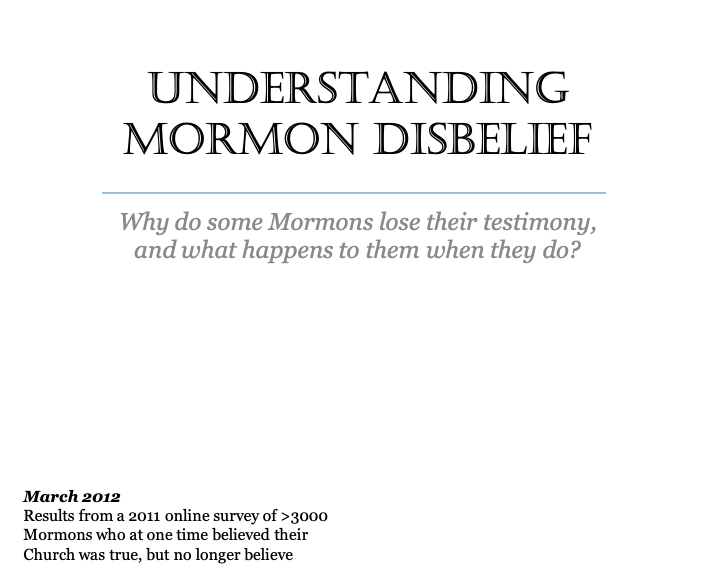Resource Category: Why Mormons Leave
UNDERSTANDING Mormon Disbelief Why do some Mormons lose their testimony, and what happens to them when they do?
March 2012 Results from a 2011 online survey of >3000 Mormons who at one time believed their Church was true, but no longer believe Table of Contents Survey background, methodology, and disclaimers
1. Church involvement of disbelievers
2. Current self-identification of disbelievers
3. Understanding issues that contribute to disbelief
4. Open comments and demographic-related issues
5. Why some disbelievers leave the Church, and why some stay
6. Openness: Understanding who doubters tell
7. Understanding the costs of disbelief
8. Understanding what would bring disbelievers back
Survey Background
This survey represents the first in a series that will explore the beliefs and practices of current and former Mormons (members of the Church of Jesus Christ of Latter-day Saints). We recognize that there are many different decisions and experiences in the lives of Mormons. Our initial area of exploration relates to reasons that Mormons question their belief in the Church or experience a “crisis of faith.”
Many believing Mormons never experience a faith crisis, and many Mormons who do experience a crisis of faith do not ultimately lose their faith in that process. Some Mormons who leave the Church, especially some converts, end up leaving because they were never fully integrated either socially or spiritually to begin with. In future surveys, we hope to explore some of those responses in more detail. However, our goal with this survey, “Understanding Mormon Disbelief,” is to increase understanding of issues relating to Mormons who, having once held firm belief in the Church, subsequently lose that belief in part or whole. Mormons sometimes refer to this process of losing belief or experiencing a faith crisis as “losing one’s testimony.” While the phenomenon of losing faith is common across all religions, there are certain truth claims and cultural factors specific to Mormonism. This survey aims to shed light on some of these unique contributors, as well as to provide further insight on the level of disclosure and perceived costs associated with disbelief within the Mormon community.
Although it is unclear exactly how many Mormons lose faith each year, our observation is that the number appears to be growing in developed countries (e.g. the United States, Europe). We also observe that many of these members were at one point highly dedicated. Whether or not the total number of disbelievers has reached a significant level, we believe that the “worth of souls is great,” and that each individual matters. We believe that there are individuals in faith crises who are suffering unnecessarily because of a lack of understanding and empathy. We have seen the pain and struggle in the lives of many of our friends – not just those who have been through a crisis of faith, but their loved ones and the overall Church community as well. We hope this survey provides a balanced voice to some of their concerns and feelings.
We also believe that many faithful, believing members of the Church may wish to better understand their fellow brothers and sisters who have struggled with or who are currently struggling with their faith. For those who wish to “mourn with those who mourn, and comfort those who stand in need of comfort,” we believe that an essential step is to understand the actual issues that are important to those who have doubts in the Church. Our goal is to create an awareness of these issues, and to facilitate the dialogue regarding how we can build compassion and understanding.
This survey has raised our awareness of the shortcomings of our own survey methodology; future surveys will address these shortcomings. Indeed, if we have learned one thing, it is that we still have much to learn. Nevertheless, we also feel that many of the insights from this survey will provide preliminary empirical evidence that can enable understanding of those struggling with faith in the Church. Some findings seem intuitive, while others may prove surprising.
-
